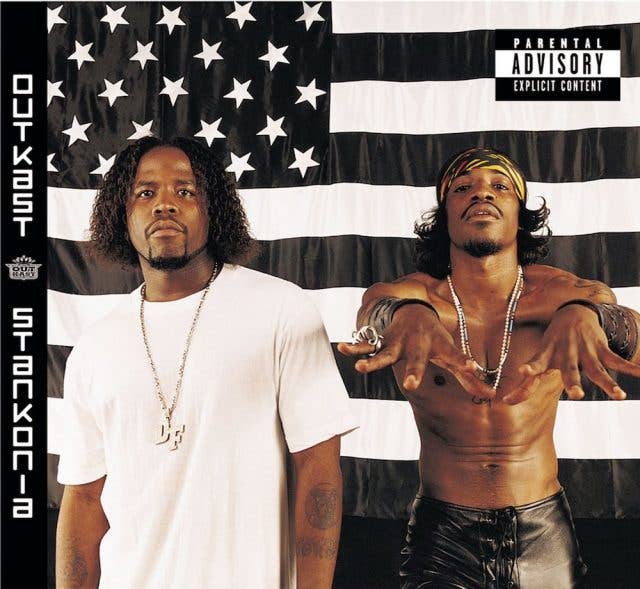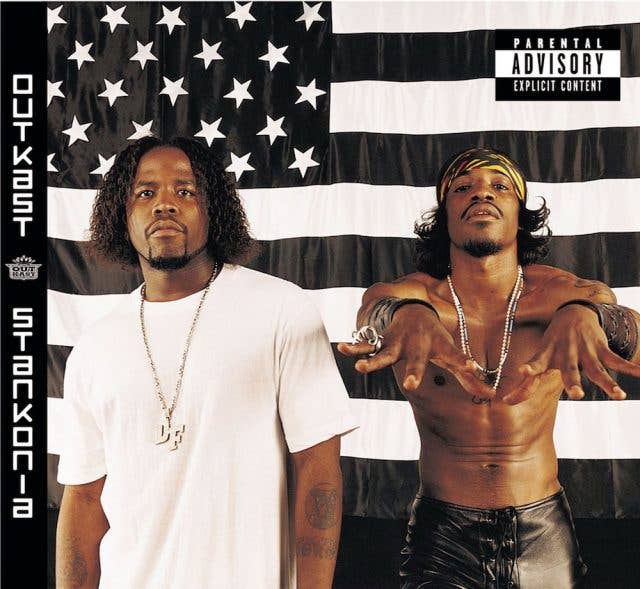
This essay was originally published on October 31, 2015.
I was 8 years old when I first heard the slow drum pattern of “Elevators,” the 1996 lead single from OutKast’s sophomore album, ATLiens. Their crown logo is tattooed on my left shoulder, and I made my pilgrimage to see them finally in concert in May 2014 on a beach in Gulf Shores, Ala. I’ve been an OutKast fan a long time, and I have seen those bus stop arguments over what OutKast album between ATLiens and Aquemini represents their best work. I saw boys throw hands, some representing the hazy love song of “Jazzy Belle” against other boys who wielded verbal boulders in the name of “Liberation.” The best of those albums may have been Aquemini because it summed up both the darkness that consumed Andre 3000 and Big Boi on ATLiens and the sly, playful light they toyed with on Southernplayalisticadillacmuzik. Neither of them, however, is the most important OutKast record. That distinction belongs to Stankonia, their fourth album.
To put it in perspective, Stankonia was released on the same day as Jay Z’s The Dynasty: Roc La Familia. Both albums clocked in at the top of the Billboard 200. Both sold over 500,000 copies with The Dynasty besting Stankonia by 40,000 copies. One was a straight up East Coast rap record that is remembered for its intro and a few tracks near the back end. The other is OutKast’s answer in small parts to Parliament Funkadelic’s Maggot Brain and in smaller parts to Sly and the Family Stone’s There’s a Riot Going On. Both are important for particular reasons; Dynasty for laying the groundwork for what would become The Blueprint and Stankonia for steering a solid two years of Southern rap before crunk came and kicked down the buildings.
The roles on Stankonia hadn’t changed much from what they gave us on Aquemini. While Big Boi was offering more free game than a clinic run by John Calipari, Dre by 2000 had fully morphed into a Bohemian who questioned a music critic’s idea of what rap was by turning part ecologist. As political as “Liberation” was two years prior, Andre 3000 took all of that yearning and aspiring for change and opted to be sarcastic. He was taunting your beliefs of what critics, mainly white critics, thought of OutKast and romanced it all in one 16-bar verse for “Humble Mumble.”
In a 2000 interview for XXL, Dre compared who he was as a rhymer to Big Boi. “Big Boi freestyles, I don’t,” Dre admited. “Because I think too much. But I’ll write one verse that’ll crush your whole album.” Big Boi came for blood on Stankonia, delivering more outright verses than his counterpart (Dre doesn’t appear on “Snappin N’ Trappin” or “We Luv Deez Hoez”) and spinning a yarn almost every time out. Dre hailed him then as the anchor of OutKast, the pimp who introduced us to his “Boom Boom Room” via MTV Cribs. But Dre will forever have the spastic stream-of-consciousness, that alien warble that sounds like it was cooked up in George Clinton’s basement. Lyrically, they delivered a push on Stankonia, with Big Boi still coming out criminally underrated and 3000 assailed as a genius. In that same XXL interview, Dre prophesied that they would become the greatest rap group of all-time post-Stankonia, without even hesitating or worrying about being wrong.
“Do you want to live or wanna exist?” It’s a question Andre poses after a flurry of them on “Humble Mumble,” a form of protest music, disguised as a gospel juke joint. Big Boi and Erykah Badu are arguing for differing forms of freedom, Big Boi discussing fight or flight techniques as a drug dealer tested by enemies, and Badu scatting along to popping cymbals and considering the freedom of self.
OutKast had been dealing with adulthood ever since 1994’s “Git Up, Git Out,” if not earlier when they chased their wants for Christmas on 1993’s “Player’s Ball.” As they grew, so did their problems. Stankonia opened up the discomfort of baby mama drama, admitting that you shouldn’t believe in your heroes (the incendiary opener “Gasoline Dreams”), loving groupies, and even teen pregnancy. “Toilet Tisha” details the thought processes of a 14-year-old girl, confused about her choice. It’s the heaviest record on Stankonia, with Dre singing, something you’d started to grow used to after “Liberation,” and Big Boi offering a makeshift eulogy for Tisha. It’s a magnificent piece of storytelling, and it feels like it could double as a horror story because Tisha’s mother wails and sobs as if every tear is a shotgun kick to the chest.
The most light-hearted moment on Stankonia? The roller-rink vibe of “Cruisin’ in the ATL.” The hardest? “Gangsta Shit.” It is a huge, huge pendulum swing that tells you there’s still nothing sweet about ’Kast or Atlanta in general. “Gangsta Shit” is nearly five minutes of the Dungeon Family from Goodie Mob to Slimm Calhoun to Dre and Big Boi breaking down what is gangsta to them. Dre offers what could be easily seen as an extension of his “Return of the G” verse and stomps all over the beat. “OutKast with a K, yeah them niggas are hard/Harder than a nigga tryna impress God/We’ll pull your whole deck, fuck pullin’ ya card/And still take my guitar and take a walk in the park….” It’s as if he’s still fighting for that legitimacy he told the world about five years prior at the Source Awards.
Stankonia also set things up for the Dungeon Family, who dropped an album, Even in Darkness, in 2001. Stankonia properly introduced Slimm Calhoun who was the next D.F. member to release a solo album. Backbone, the D.F. rapper who first broke through on 1998’s hustler’s prayer “Slump,” returned for “We Luv Deez Hoez” and released his own debut album, Concrete Law, in 2001 with his trademark single, “5 Deuce 4 Tre.” However, there is no greater debut on Stankonia than that of Killer Mike. He only gets one song, the back and forth of “Snappin’ and Trappin’,” but he declared with one verse that he’d already delivered a classic.
By the time the dust settled, Stankonia stood tall as one of the most revered rap albums of 2000 by critics, eventually landing at 359 on Rolling Stone’s list of the 500 Greatest Albums of All Time. It kicked in the door for Southern rap’s now understood dominance as more albums from Southern artists have gone gold or platinum. What Big Boi and Dre perfected here, they carried over to their 2003, Grammy-winning double album, Speakerboxxx/The Love Below. That’s what Stankonia laid the groundwork for. Not to mention how it confirmed that OutKast was the undisputed greatest duo in hip-hop (and still cooler than Freddie Jackson sippin’ a milkshake in a snowstorm).



